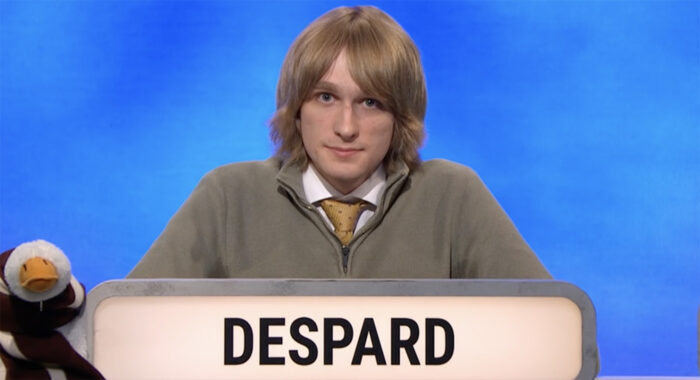
Oscar Despard recently joined the LMB’s Cell Biology Division, where he has begun a Ph.D. in Juliette Fedry’s group. Before this, Oscar completed undergraduate studies at Christ’s College, Cambridge. In his final year, Oscar captained the college team on University Challenge, which is currently airing on BBC Two. We recently spoke to Oscar about his experience on the show. He shares his recollections (with no spoilers!) below.
How did you end up on the team?
I’ve watched the show for a very long time, and I’ve always had the idea that it would be fun to take part. I went about setting up a quiz society at Christ’s College which would administer the college’s participation. We ran a two-round selection process starting with an online quiz that people could do in their own time. And then we invited the ten best scorers to take part in an in-person round on the buzzer. We got the President of the University of Cambridge Quiz Society to independently judge and help decide who should be on the team. Obviously, you want to take four very good people, but you don’t just want to select the four best people – you need people who have complementary knowledge bases. The team we managed to assemble had a mathematician, a biochemist, a linguist, and a classicist.
How did you end up as team captain?
Honestly, that kind of just emerged. I was handling a lot of the administrative duties anyway and, apart from giving the answers on the show, that’s the main thing the captain does. When we were organising things and speaking to the producers, I just carried on in that capacity. We didn’t have a formal discussion – it just happened.
What was the preparation process like?
It was very fun actually. We designed a spreadsheet which had about 200 categories on it, which ideally would cover all human knowledge. Then we split that between the four of us and we all took different categories. I took biology, some chemistry, and Irish, British and Commonwealth literature. Everyone got topics that they were interested in revisiting. I got an excuse to do things like read all of Shakespeare, which I wouldn’t have got around to if I hadn’t had some impetus to do it.
Did anything surprise you about the show?
I was actually surprised by how closely the process of filming an episode resembled watching an episode. I was expecting to enjoy it, but I was surprised by just how fun it was. And Amol Rajan and Roger Tilling (who is the ‘voice’ of the show) were lovely. Finally, I didn’t realise before we went into the studio that the two team buzzers sound different. Despite having watched it for several years, I was oblivious that one of them is a bell and the other one has more of a buzzing sound. I was probably too focused on the questions!
Did you have any team tactics?
No, we were not very organised in that respect. The most important thing to be a cohesive team, is you need a very good idea of what the other people on your team are good at. Generally, unless you’re very confident, you refrain from buzzing if you think someone else’s guess is likely to be better than yours. For example, if there was a question on Scottish Kings, I won’t be buzzing because I know that Brendan Bethlehem sitting to my right is going to get that way before I could. The worst thing to do is get a question wrong when somebody else in the team could have gotten it.
On a different subject entirely, how did you end up choosing the LMB to do your Ph.D.?
I was very fortunate to find a supervisor who was doing work that I found very interesting. Last year, I attended the John Kendrew lecture at the LMB, which was given by Wolfgang Baumeister on the topic of cryo-electron tomography (cryo-ET). It was a technique I’d heard of before, but it wasn’t really something I had considered for a Ph.D., but that was quite an inspiring talk. And then I found that Juliette, my now-supervisor, was doing cryo-ET with reference to cellular proteostasis, which is a topic I thought was quite interesting with very wide-ranging implications across different aspects of biology. It was just an ideal fit really. Obviously the LMB has its reputation, that it can be justly proud of, so it’s a privilege to be able to work here and to have access to, not just the group that I’m in, but also the general environment in which to do science and discuss it. It’s lived up to all my hopes so far.
Further references
University Challenge: Exeter College, Oxford v Christ’s College, Cambridge (N.B. TV license required)
‘Our biggest fear was cricket’: meet the Christ’s University Challenge Team